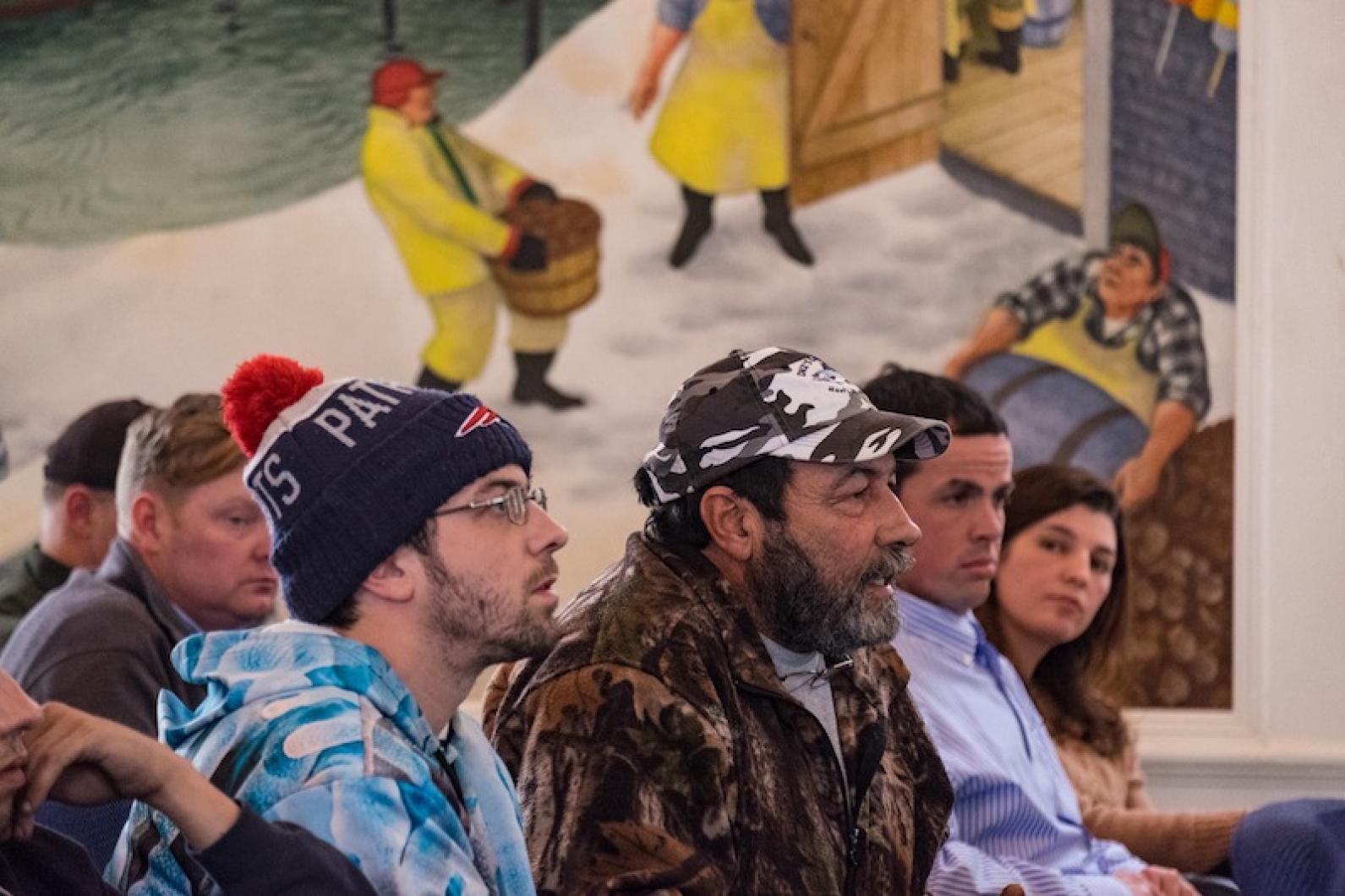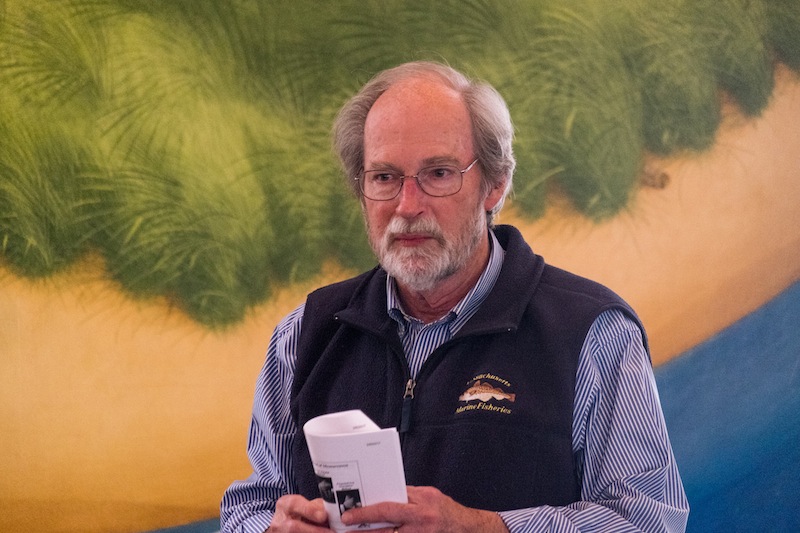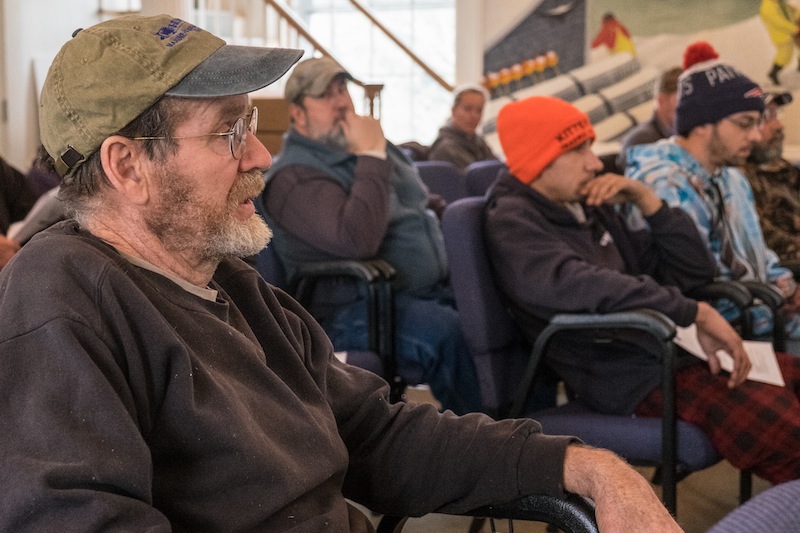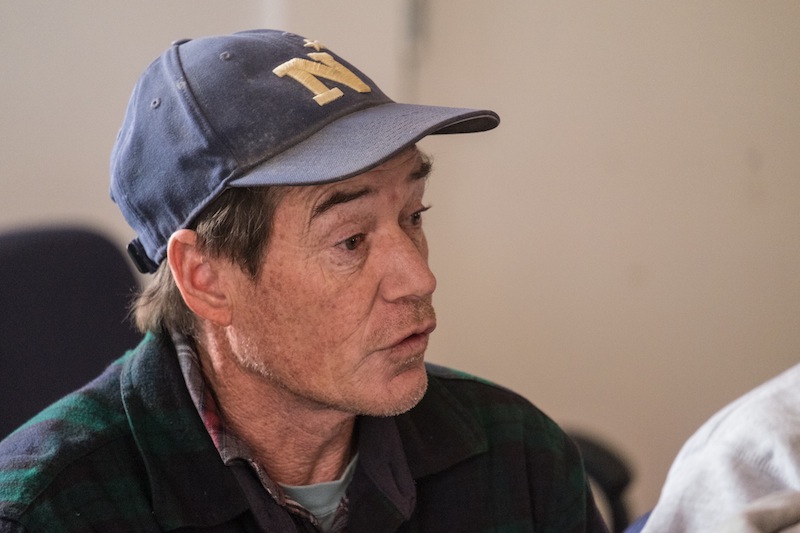Martha’s Vineyard commercial fishermen spent more than two and a half hours Wednesday letting the state’s Division of Marine Fisheries know what they think of 18 proposed rule updates and new regulations. Some of the changes are minor tweaks to clarify existing rules, but others, if enacted, would affect the Vineyard’s fishing industry more significantly.
Island speakers vehemently opposed a draft proposal to increase the minimum size of knobbed and channeled whelk, generally called conch, by three sixteenths of an inch in 2017.
“That is a horrifying number,” said Tom Turner, a longtime Edgartown fisherman. “You’re guaranteeing the death of a fishery, and that would happen within two years of a three-sixteenth increase.”
Anything that harms the Vineyard’s conch fishery also endangers the Island’s commercial waterfronts, Chilmark selectman Warren Doty told a visiting panel that included Division of Marine Fisheries director David Pierce, deputy director Dan McKiernan and four members of the nine-person Marine Fisheries Advisory Commission that will ultimately decide on the new rules.
“The key right now to keeping that working waterfront going is the conch catch,” Mr. Doty said. “We need to keep landings coming in.” Chilmark willingly forgoes the hundreds of thousands of dollars a year it could make by turning Menemsha into a summer marina instead of a year-round fishing port, he said.
If the Vineyard conch fleet loses boats due to lower catches caused by the larger minimum size, commercial buyers will also drop out, Mr. Doty said. “We lose the buyers, we lose the dock space and that’s what we’re trying to keep alive on Martha’s Vineyard: the working waterfront.”
State fisheries officials want the increase, currently planned to reach a total size of three and seven eighths inches in 2029, because they believe conch are in long-term decline, Mr. McKiernan told the group. But Vineyarders strongly disagreed, arguing that the Division of Marine Fisheries is out of touch with what’s happening in local waters.
“The conch numbers in Vineyard and Nantucket sounds are at an all-time high,” Mr. Turner said. “DMF needs to take advantage of the numerous offers to come out on our boats and see what’s happening on the water. We’re out there every day. We can show you what the population is.”
Alec Gale of Menemsha Fish House agreed, in strong terms. “The field work is lacking,” he charged. “You guys won’t come over here.”
Commercial fisherman Glenn Pachico echoed the others’ comments. “The best data comes from the fishery,” he said. “I worry about what’s going to happen to the industry . . . This is going to ruin the fishery.”
Mr. McKiernan responded to the fishermen: “We hear you: No three sixteenth, and sample on your boats.”
Vineyard fishermen also said the state’s proposal to prohibit whelk harvests during the late summer spawning field, requiring conch fishermen to remove their gear from the water during that period, would be acceptable for a 31-day period, but not six weeks as drafted.
Meanwhile, a petition from the town of Nantucket that would prohibit dragging, trawling and other mobile-gear fishing in the waters around Nantucket from May 1 to Oct. 31 annually, to protect the squid fishery there, got a frosty reception from the Vineyard fishermen.

“I think they just want it for themselves,” said dragger Peter Krzyzewski. Nantucket waters have fewer striped bass because of environmental changes, he added. “The water is warming and everything is moving further north,” Mr. Krzyzewski said. “It has nothing to do with the effects of fishing.”
Mr. Turner, who uses fixed gear aboard his boat Sea Raven, said the closure would displace mobile-gear boats to other parts of the Sound, pitting one group of fisherman against the other. “I don’t think that closure is a great idea,” he said.
Mr. Pierce, the head of the state fisheries division, said his staff had found so little evidence for the Nantucket petitioners’ case that initially he was not inclined to bring it to the advisory commission at all, but wanted to get public comment because “this is such a controversial issue.”
Wednesday’s hearing drew more than two dozen people to the Katharine Cornell Theatre atop Tisbury town hall. Among the other rule changes discussed was a refinement of the law covering commercial fishing for striped bass, which Mr. McKiernan said had led to a shadow market for shore-caught fish.
“What we discovered was there were people that bought themselves boat permits, but they weren’t fishing from boats,” he explained. The result: shore anglers along Cape Cod Canal were taking up to 15 striped bass — the boat limit — instead of the shore limit of two, and selling the fish to boat captains who passed them off as their own catch.
Vineyarders had no problem with the state clarifying the striped bass rule, but objected to another proposal that, starting June 10, would double the trip limit for horseshoe crabs, from 300 to 600, and eliminate the five-day lunar spawning closures.
“If we go to 600 crabs, they’re going to give us a buck apiece for them,” Mr. Krzyzewski said, referring to horseshoe crab buyers from the biomedical industry and those who use the crabs as bait.
Fishermen also discussed, without reaching a clear consensus, a state proposal aimed at clarifying whether, and how much, out-of-season catch may be taken recreationally — say, for a fisherman’s supper — during a commercial fishing trip. Currently, Mr. McKiernan said, environmental police officers have no clear rule to guide them when they find a dragger with a few fluke in the cooler when fluke are not in season.
“If you can make it so we can be honest, I’m sure we’ll all be honest,” Mr. Pachico said, to general laughter.
“You have a few days to think deep thoughts on this one,” Mr. McKiernan responded. The state is taking written comments on the proposed rules until 5 p.m. Feb. 17.
The hearing was the second of four public forums being held in fishing communities to before the state advisory commission makes its final decision on the proposed rules at a meeting March 9.
Hearings were also held in Gloucester and Buzzards Bay last week, and the Nantucket hearing is scheduled for Monday morning. A primer document covering all 18 proposed regulations is online.
Written comments can be e-mailed to marine.fish@state.ma.us or sent by post to 251 Causeway Street, Suite 400, Boston 02114.









Comments (11)
Comments
Comment policy »